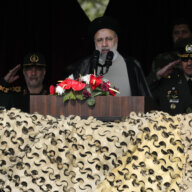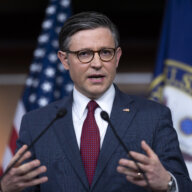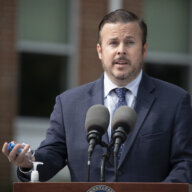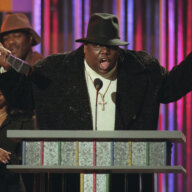It wasn’t typical election news, but it set tongues a-wagging across the country.
A 74-year-old Bernie Sanders delegate in town for the Democratic National Convention was accused of slathering his tongue over the breasts of a younger female delegate during a late night at a hotel bar. But on Thursday, a judge acquited Walter Weeks, of Delaware County, of a criminal charge accusing him of the salacious act.
The story was widely reported after Gwendolyn Snyder, 31, of Philadelphia, went to the news media and criticized District Attorney Seth Williams’ decision not to press charges. The D.A.’s office reversed course and announced charges against Weeks in September. At Thursday’s bench trial, Snyder described a vile encounter just after 2 a.m. in the bar at the Doubletree Hotel on South Broad Street. She said the older man hugged her. He then buried his face in her breas. He “looked almost like Gene Simmons from Kiss, licking me really elaborately,” she said, adding that he usedhis tongue like he was administering cunnilingus.
“Then he looked up at me and smiled, and said, ‘Can we still be friends?’” she testified.
Judge Charles Hayden threw out an indecent assault charge against Weeks after a three-hour bench trial. In a brief statement, Hayden said several character witnesses who testified on behalf ofWeeks factored into the acquittal. The friends who appeared in support of Weeks disagreed with Snyder’s portrayal of him as a predator.
One person who knew Weeks said after the trial he has a medical condition that causes dry-mouth, sohe often has to lick his lips, andsuggested that may have been misinterpreted by Snyder.
Two other Sanders delegates in the hotel that night testified they didn’t see or hear about an assault.
“I wasn’t really paying attention, but out of the corner of my eye, it looked like a good-bye hug,” testified delegate Peter Winebrake, who was sitting next to Weeks at the bar. “She reacted angrily to whatever happened. Then she left. It didn’t seem to be a big deal at the time.” As Snyder told it, she shoved Weeks away, cursed at him and told him what he had done was “not OK” before fleeing back up to her hotel room. Surveillance cameras caught her returning to the lobby 10 minutes later. That’s when she reported the encounter to Winebrake and Charles Pascal, leader of the Pennsylvania Sanders delegates. Neither recalled her saying the words “sexual assault.”
According to Pascal,Snyder told them Weeks kissed and licked her neck during a hug. It was after 2:30 a.m. and he offered to call Democratic party officials the next day to get their input.
“I didn’t hear a crime,” he testified, adding that he “absolutely” would have taken action if he had.
The next day, he said, he learned Snyder accused Weeks of manipulatingher dress and licking her breast just above the nipple during the hug. He and another leading delegate questioned Weeks, who denied everything. All he recalls is giving the hug, his defense attorney said. Meanwhile, Snyder testified that she reported the attack to police after realizing Weeks’ credentials would not be revoked and “nobody would take me seriously,” she said. She spent the final daysof the convention emotionally overwhelmed, just trying to avoid seeing Weeks. Outside of court, seemingly in shock over the acquittal, Snyder stood by her original accusations and denied changing her story, saying she definitely told Pascal and Winebrake she was sexually assaulted. “There’s no way given the way he did it, and the way he was looking at me when I caught him doing it, that it was an accident,” she said. “His not having a reputation because women aren’t coming out about it doesn’t mean he hasn’t done it before and won’t do it again.” Weeks declined to comment outside of court, but his lawyer Michael J. Engle said that it was a “travesty” that Weeks and his family had to endure the allegations for months.
“[DA] Seth Williams was under political pressure at the time,” Engle asserted. “It’s unfortunate that political correctness and political pressure led to charges that were unwarranted. … We should never have been here to begin with.”

































